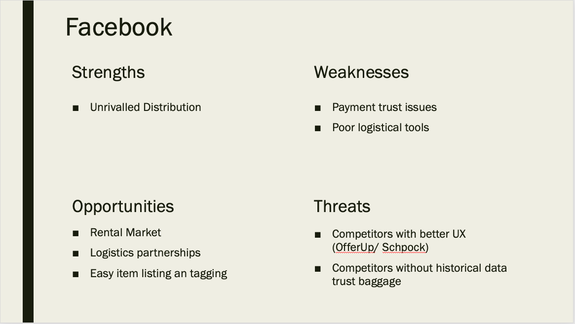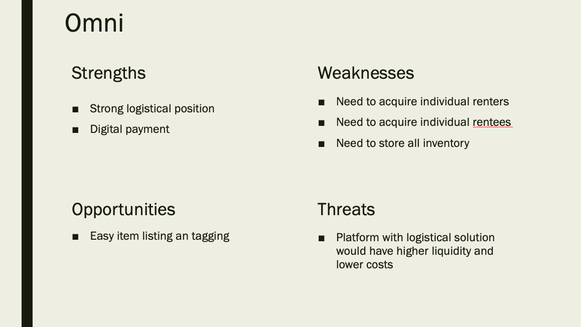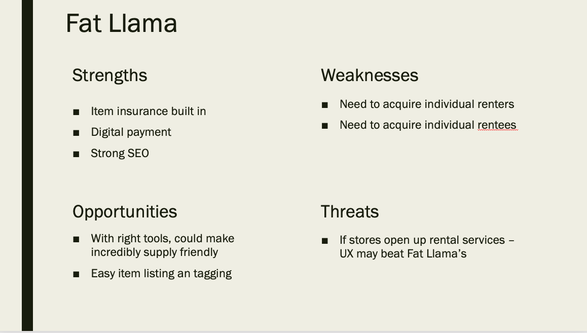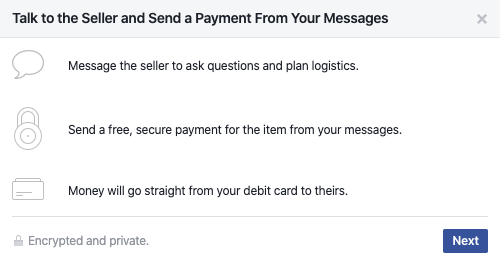|
The sharing economy narrative:
Market trends I’ve been thinking about that make this relevant:
But I find myself disillusioned with the state of the sharing economy so far. This whole story overlooked the key principles in human nature and business building. The problems. The core problems and jobs that the customer has, exist mostly regardless of the form in which the solution comes. The varying solutions will just fulfil and solves these needs differently. I think it’s mostly fair to say at this point a sharing marketplace for your stuff sounds great. You’re unlocking assets! But does a marketplace work for the customers needs? Why would a customer care if they hire a tool from a marketplace vs a neighbour or a business? In theory a marketplace with high enough liquidity should lower the price of each item (higher competition) and lower the distance/time to product (increased area saturation). The good news is - sharing used vs buying brand new = cheaper in +99% cases. So even without a marketplace, the removal of a gatekeeping store has lowered the prices of customers getting to the goods. There is however an ongoing issue with the time/distance to product of a marketplace that is making this model impossible to succeed in. Let’s take a look at how this effects three Peer to Peer marketplaces. Omni vs Fat llama vs Facebook
Omni
Fat Llama
Interesting to see at this point - Omni has pivoted and is no longer a consumer facing marketplace. It now provides a suite of tools to turn any store into a rental location of their own assets. ALSO - While writing this post, Facebook has begun to ship/test new marketplace features. In these marketplaces it’s a huge juggle of demand & supply saturation with the added pieces of trust, insurance and logistics. That sounds like a crazy hard business to win at. Maybe the p2p marketplaces that we were told would change the world were just big gassy empty visions conjured up by tech journalists that don’t understand business, customers or digital products. Maybe the best peer to peer marketplace will be the one that partners with amazon lockers or better yet, taskrabbit/uber so we can move these things around for a simple $3 delivery fee. Can you imagine? If I could have the item delivered to me for $3 - that feels smoother than travelling to buy one or waiting 48 hour to receive one in the mail. Having undertaken a small DIY project that snowballed into a 5 day nightmare in my Mountain View apartment. I spent a lot of time thinking about these dynamics and how the p2p future had forsaken me. I should have been able to rent all of the tools, equipment and supplies I needed from my neighbours. The right tools would have gotten the job done in a day - MAX. There is no way I would have received the full economic benefit available if I had bought all the tools I needed. Side note: I did buy 2 drills - if you live in Mountain View and need a drill. I’m your guy. I also can’t be the only person that feels this way. The bay area is rife with apartment living and there simply isn’t enough space to own all of the typical American things. The further I have thought about this, the more I wonder if it makes sense to further focus. Fat Llama has since expanded to allow bikes, cars, tools, and all sorts on their platform while leaving key features required by photography renters out of the product. Maybe the future should look more like category specific p2p platforms. One specific for DIY, one specific for photography, one specific for sports etc Turo & get around have already sliced off a segment for cars. I’ll admit this vision clearly flies in the face of the mega, omni-category p2p marketplace that Facebook could be. Interesting MarketsHere's some interesting markets to savour when thinking about unlocking value in unused goods here:
ConclusionI don’t know if we’ve even seen the end of V1 of sharing economy or p2p marketplaces that really work for the consumer (or supplier) but what we have is not it’s final form.
There are trillions of dollars of unused assets that can be unlocked. Remember - the key challenges are:
And we have to remember the alternative - the existing user behaviour is taking a deep breath, and ordering the tool you want on amazon - only for it to show up tomorrow. Or even more frictional - you driving over to target and buying the drill you need. Both of which take less than 30 minutes.
0 Comments
Leave a Reply. |
Archives
June 2024
Categories
All
|





 RSS Feed
RSS Feed